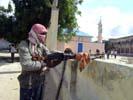‘Don’t Blame’, because he is not your son, Mr. Prime Minister
I am not saying that all parties involved in a particular incident should be jailed or penalized, but do we at least allow such matters to be debated openly or investigated with transparency?
By Ng Ooi Cheng
Journalist Noramfaizul Mohd Nor was one of the casualties in many 1Malaysia-tagged programmes. Last month and in June alone, nearly 200 primary students in different schools of Melaka and Johor experienced symptoms including stomachache and vomiting due to milk poisoning under the 1Malaysia School Milk programme, and they seemed to carry no weight in the UMNO-controlled newspapers. In 2010, more than 20 primary students fell into a river at night in Kuala Dipang, Perak at the 1Malaysia Camp, and three of them died.
Definitely, no one would have wanted the above incidents to take place.
However, had the organizers and parties involved taken enough consideration, precautions and measures to prevent the undesired incidents? (Read report below)
I was upset when I saw the headline ‘Don’t Blame’ in a local newspaper yesterday (5 September), alluding to a comment by Prime Minister Najib about what had happened to Noramfaizul. My spontaneous reaction from my heart was, “Don’t blame? Of course, because he is not your son.”
It is this ‘blameless’ attitude that people are now facing hard times, mistakes are repeated, and many culprits escape. So, nobody is accountable for any faults, or all faults are denied as false.
In Japan, Naoto Kan relinquished his prime minister post, kneeled down and apologized when admitting his government’s responsibility for the HIV-tainted blood incident when he was the health minister. In Korea and Taiwan, former presidents got jail terms for corruption. In China, businessmen were sentenced to death for tainted milk powder that killed several babies.
I am not saying that all parties involved in a particular incident should be jailed or penalized, but do we at least allow such matters to be debated openly or investigated with transparency?
For instance, in the case of Noramfaizul, did those organizing the mission understand the modus operandi of journalists when in a battlefield or war zone? Did they provide the journalists with adequate protection? I have learnt from news reports that the Malaysian journalists did not even wear bullet-proof jackets.
Did anyone have full understanding of what is happening in Somalia? It is basically a state of anarchy. People who follow the international news know that the Gulf of Aden offshore Somalia recorded piracy cases higher than any other region over the last few years, and they were mainly Somali pirates who were involved. Dozens of journalists were reported to have been killed in Somalia and foreign journalists have been fleeing the country. A local journalist was reported to have said that both insurgents as well as pro-government forces were targeting journalists as they did not want any record of their criminal acts.
Everything is too late now as damage cannot be undone. Heroic titles and compensation can be given, but the beloved father, husband and son to family members cannot be returned.
May he rest in peace and his family blessed.

It seems there may be a campaign underway to rid Mogadishu of its independent media. Recent reports highlight the increasing harassment and intimidation of journalists in Mogadishu.
While dozens of journalists have been killed since late 2006, there has been a visible increase in the targeting of journalists this year. Thus far in 2009 , five journalists have already been killed – most recently Mukhtar Mohamed Hirabe, director of Radio Shabelle. Dozens more have fled Mogadishu after receiving death threats. According to Hamdi Kadiye, an executive member of the National Union of Somali Journalists, “We [journalists] are in a very difficult and dangerous situation. We are being forced to choose between reporting on what is happening and our lives.”
But why are journalists being targeted? According to Hamdi Kadiye, it is because the groups fighting, both the insurgents and pro-government forces, want to ensure there are no records of the crimes they are committing. Over the past month, fighting has overtaken Mogadishu, resulting in the displacement of 117,000 people since early May. According to UNICEF’s acting representative for Somalia Hannan Suleiman, it “is the most concentrated displacement of civilians the city has seen in years.” Even more worrying are U.N. reports of ongoing war crimes and crimes against humanity, including the use of boys – some as young as nine – as fighters on the front lines, and increasing reports of rape and sexual violence against women. These are the stories the fighters want silenced due to fears that media reports could be used as evidence against them in the future.
Silencing these reports would be a catastrophe for the Somali people. As fewer international journalists are able to travel to Somalia, it has fallen to the independent media within Mogadishu to continue reporting on the ongoing violence. Without their reporting, the world will know woefully little about the horrors facing the Somali people. Hamidi Kadiye put it best when he said, “If journalists left and the independent media ceased to exist, there would be no one to tell the story of those suffering.”

